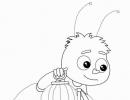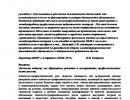You're right drunk monster truth in wine. Block stranger poem. Analysis of the poem "The Stranger" by A. A. Blok
Hot air is wild and deaf
And rules drunken shouts
Spring and pernicious spirit.
Over the boredom of country cottages,
Slightly gilded bakery pretzel,
And the cry of a child is heard.
Among the ditches they walk with the ladies
And a woman screams
And in the sky, accustomed to everything
The disk is pointlessly twisted.
Reflected in my glass
And moisture tart and mysterious
Like me, humble and deaf.
Sleepy lackeys stick out,
And drunkards with rabbit eyes
"In vino veritas!"* they shout.
(Is this just a dream?)
Maiden's camp, seized by silks,
In the foggy window moves.
Always without companions, alone
Breathing in spirits and mists,
She sits by the window.
Her elastic silks
And a hat with mourning feathers
And in the rings a narrow hand.
I look behind the dark veil
And I see the enchanted shore
And the enchanted distance.
Someone's sun has been handed to me,
And all the souls of my bend
The tart wine pierced.
In my brain they sway
And bottomless blue eyes
Blooming on the far shore.
And the key is entrusted only to me!
You're right, drunk monster!
I know: the truth is in wine.
Analysis of the poem "The Stranger" by A. A. Blok
Blok's most famous poem, relating to the second period of creativity, is "The Stranger".
The entire first stanza of this poem is actually an extended metaphor, although many researchers argue that it is possible to establish with the utmost accuracy where the events described in the poem took place. The picture itself does not need such specification:
Hot air is wild and deaf
And rules drunken shouts
Spring and pernicious spirit"
The next three stanzas further reinforce this motif, emphasizing the disharmony of the world:
And a woman screams
And the sky, accustomed to everything,
The disk is pointlessly twisting.
These pictures prepare the appearance of a miracle: the contrast between the past and the appearance of the beautiful Stranger is too great. The vision itself arises, as it were, from the evening twilight, from the vulgar cry of drunkards, the creak of oarlocks, the squeal of women, it arises as a denial of a disharmonious world.
A stranger among restaurant tables, among drunkards. The fact that it could just be a dream is indicated by only one unexpected detail - "breathing in spirits and mists", - a little explains the words of the author. "Always and everywhere, more and deeper than anything, lies a peaceful fog ..". This image of fog further enhances the mystery of the appearance of the Stranger. The next three stanzas are filled with complex symbolism that cannot be directly deciphered, and does not need it. Here everything is fragile, based on mystery, the soul is freed from the vulgar pressure of everyday life, flies away to other worlds, discovering treasures unknown to the world in its depths. It is important that the human soul for a moment came into contact with the world of beauty. In this context, the words no longer cut the ear:
Blooming on the far shore.
The poem ends with a stanza, where there are two exclamatory sentences, the meaning of which is contrasted with each other:
And the key is entrusted only to me!
You're right, drunk monster!
I know: truth and guilt.
Poem. Alexander Blok: a stranger.
"Poems about love and poems about love" - love lyrics Russian Poets & Anthology of Russian Poetry. © Copyright Peter Solovyov
It is necessary to read the verse “Stranger” by Alexander Alexandrovich Blok in class and at home online with an understanding of two important facts. The first is that in it the poet expressed his worldview, embodying in the image of a stranger in silks what is sorely lacking in the world - romance, beauty and love. The second is that this is a classic example of symbolic poetry (the poem was written in 1906), which requires an appropriate reading.
The work is divided into two parts. Its first half is actually one metaphor, expanded to several stanzas - it shows the vulgarity and hopelessness of everyday life. And now the beautiful, embodied in a woman, breathing perfumes and mists, enters the dreary atmosphere. The text of Blok's poem "The Stranger" shows a divided reality, an abyss between reality and the dreams of a lyrical hero. But in fact, if you read it in full in a literature class or at home, it is easy to see that hope is embodied in the image of a stranger.
The lyrical hero, who has high feelings for that unearthly woman who appears before him, understands that his life is not so disgusting, that the lost faith in good is returning. This poem needs to be taught in order to feel all the vibrations of the poet's gentle nature and his joy from meeting with a miracle.
In the evenings above the restaurants
Hot air is wild and deaf
And rules drunken shouts
Spring and pernicious spirit.
Far above the lane dust,
Over the boredom of country cottages,
Slightly gilded bakery pretzel,
And the cry of a child is heard.
And every evening, behind the barriers,
Breaking pots,
Among the ditches they walk with the ladies
Proven wits.
Oarlocks creak above the lake
And a woman screams
And in the sky, accustomed to everything
The disk is pointlessly twisted.
And every evening the only friend
Reflected in my glass
And moisture tart and mysterious
Like me, humble and deaf.
And next to the neighboring tables
Sleepy lackeys stick out,
And drunkards with rabbit eyes
"In vino veritas!"* they shout.
And every evening, at the appointed hour
(Is this just a dream?)
Maiden's camp, seized by silks,
In the foggy window moves.
And slowly, passing among the drunk,
Always without companions, alone
Breathing in spirits and mists,
She sits by the window.
And breathe ancient beliefs
Her elastic silks
And a hat with mourning feathers
And in the rings a narrow hand.
And chained by a strange closeness,
I look behind the dark veil
And I see the enchanted shore
And the enchanted distance.
Deaf secrets are entrusted to me,
Someone's sun has been handed to me,
And all the souls of my bend
The tart wine pierced.
And ostrich feathers bowed
In my brain they sway
And bottomless blue eyes
Blooming on the far shore.
There is a treasure in my soul
And the key is entrusted only to me!
You're right, drunk monster!
I know: the truth is in wine.
"The Stranger" Alexander Blok
In the evenings above the restaurants
Hot air is wild and deaf
And rules drunken shouts
Spring and pernicious spirit.Far above the lane dust,
Over the boredom of country cottages,
Slightly gilded bakery pretzel,
And the cry of a child is heard.And every evening, behind the barriers,
Breaking pots,
Among the ditches they walk with the ladies
Proven wits.Oarlocks creak above the lake
And a woman screams
And in the sky, accustomed to everything
The disk is pointlessly twisted.And every evening the only friend
Reflected in my glass
And moisture tart and mysterious
Like me, humble and deaf.And next to the neighboring tables
Sleepy lackeys stick out,
And drunkards with rabbit eyes
"In vino veritas!"1 they shout.And every evening, at the appointed hour
(Is this just a dream?)
Maiden's camp, seized by silks,
In the foggy window moves.And slowly, passing among the drunk,
Always without companions, alone
Breathing in spirits and mists,
She sits by the window.And breathe ancient beliefs
Her elastic silks
And a hat with mourning feathers
And in the rings a narrow hand.And chained by a strange closeness,
I look behind the dark veil
And I see the enchanted shore
And the enchanted distance.Deaf secrets are entrusted to me,
Someone's sun has been handed to me,
And all the souls of my bend
The tart wine pierced.And ostrich feathers bowed
In my brain they sway
And bottomless blue eyes
Blooming on the far shore.There is a treasure in my soul
And the key is entrusted only to me!
You're right, drunk monster!
I know: the truth is in wine.
Analysis of Blok's poem "The Stranger"
When it comes to the creative heritage of the Russian poet Alexander Blok, many often recall the textbook poem Stranger, written in 1906 and which has become one of the best romantic works of this author.
The Stranger has a rather sad and dramatic backstory. During the period of writing the poem, Alexander Blok experienced a deep emotional drama caused by his wife's betrayal, which went to the poet Alexander Bely. According to the recollections of the poet's relatives, he uncontrollably drowned his grief in wine and spent days and nights sitting in cheap drinking establishments filled with dubious personalities. It is likely that in one of these restaurants Alexander Blok met a mysterious stranger - an elegant lady in a hat with a mourning veil, who every evening at the same time occupied a table near the window, indulging in her sad thoughts.
In this establishment, she clearly looked like a foreign creature, belonging to a completely different world, where there is no place for dirt and street swearing, prostitutes, gigolos and lovers of cheap booze. And, quite likely, it was the image of a mysterious woman, so out of place in the interior of a cheap tavern, that aroused in the poet a desire not only to delve into her secret, but also to analyze own life realizing that he was wasting it.
Describing the environment around him, Alexander Blok deliberately contrasts the dirt and drunken fumes with the divine image of an unknown woman, who, apparently, is experiencing an equally deep spiritual drama, but does not stoop to drown her grief in alcohol. The realization that the fragile stranger turns out to be much stronger and more courageous than all those men who surround her gives rise to a kind of admiration in the poet's soul. This is the first bright moment in his life in many months, which he tries to grab onto, like a lifeline, to emerge from the abyss of unrestrained drunkenness. The fact that he succeeded brilliantly is confirmed by the very fact of the existence of the poem "The Stranger", which, as it turned out later, became a turning point not only in life, but also in the work of Alexander Blok.
AND precisely the opposition of the dark and light sides of life, which is very clearly seen in this lyrical and very moving work, indicates that the poet understands very clearly that his life is going downhill at an inexorable speed. Such an antithesis sets the rhythm for the whole work, as if emphasizing that there is another reality in which even with a broken heart one can rejoice and be surprised at simple things that evoke the brightest and most exciting feelings. The image of a stranger identifies a slightly ajar door to another reality, and all that remains is to take a couple of unsteady steps to find yourself where there is no place for a gloomy reality with its vulgarity, betrayal, cruelty and dirt.
Stay in the arms of Bacchus or try to get into mysterious world strangers filled with light and purity? Alexander Blok chooses the third way, arguing that there is also truth in wine, but at the same time deciding not to stoop to the level of those who drink not in order to comprehend it, but in order to forget it. This is confirmed by one of the last stanzas, in which the poet confesses: “There is a treasure in my soul, and the key is entrusted only to me!”. These words can be interpreted in different ways, but their most likely meaning is that only spiritual purity, the ability to love and forgive, give a person the strength to live on. But in order to realize this, you must first sink to the very bottom, and then meet a mysterious stranger who will make you believe in your own strength with her mere presence, even if her image is a figment of the imagination poisoned by alcohol.
Analysis of A. Blok's poem "The Stranger"
This poem by Alexander Blok belongs to the period of writing “The Terrible World”, when the main thing in the perception of the world by the poet were feelings of longing, despair and disbelief. The gloomy motives of many poems of this period expressed Blok's protest against cruelty. scary world, which turns all the highest and most valuable into bargaining items. It is not beauty that reigns here, but cruelty, lies and suffering, and there is no way out of this impasse. The lyrical hero surrenders to the poison of hops and violent revelry
And every evening the only friend
Reflected in my glass
And moisture tart and mysterious,
Like me, humble and deaf.
During this period, the poet breaks with his symbolist friends. His first love left him - Lyubochka, the granddaughter of the famous chemist Mendeleev, went to his close friend, the poet Andrei Bely. Blok seemed to be drowning despair in wine. But, despite this, the main theme of the poems of the period of the “Scary World” is still love. But the one about whom the poet writes his magnificent poems is no longer the same Beautiful lady but fatal passion, temptress, destroyer. She torments and burns the poet, but he cannot escape from her power.
Even about the vulgarity and rudeness of the terrible world, Blok writes soulfully and beautifully. Although he no longer believes in love, does not believe in anything, but the image of a stranger in the poems of this period still remains beautiful. The poet hated cynicism and vulgarity, they are not in his poems.
“The Stranger” is one of the most characteristic and beautiful poems of this period. Blok describes the real world in it - a dirty street with sewers, prostitutes, a realm of deceit and vulgarity, where "tested wits" with ladies walk among the pouring slops.
In the evenings above the restaurants
Hot air is wild and deaf
And rules drunken shouts
Spring and pernicious spirit.
The lyrical hero is lonely surrounded by drunkards, he rejects this world that terrifies his soul, similar to a booth, in which there is no place for anything beautiful and holy. The world poisons him, but a stranger appears amidst this drunken frenzy, and her image awakens bright feelings, it seems that she believes in beauty. Her image is surprisingly romantic and alluring, and it is clear that faith in goodness is still alive in the poet. Vulgarity, dirt cannot tarnish the image of a stranger, reflecting Blok's dreams of pure, selfless love. And although the poem ends with the words “In vino veritas”, the image of a beautiful stranger inspires faith in the bright beginning of life.
Blok Alexander Alexandrovich (1880–1921), Russian poet. Born 16 (28) November 1880 in St. Petersburg. The son of a law professor, with whom Blok's mother divorced shortly after the birth of the poet. He was brought up in the family of his grandfather A.N. Beketov, botanist, rector of St. Petersburg University. Relations with his father, who occasionally came to St. Petersburg from Warsaw, were reflected in the unfinished poem Retribution (1917-1921). The image of a “demon”, alien to any illusions, but at the same time endowed with ineradicable dreaminess, is inspired by reflections on the fate of his father, the last Russian romantic who fell victim to the fate of history, which brought the era of catastrophes of unprecedented scale and tragedy very close. Blok also felt himself to be such a romantic, who also experienced the retribution of history.
In the evenings above the restaurants
Hot air is wild and deaf
And rules drunken shouts
Spring and pernicious spirit.
Far above the lane dust,
Over the boredom of country cottages,
Slightly gilded bakery pretzel,
And the cry of a child is heard.
And every evening, behind the barriers,
Breaking pots,
Among the ditches they walk with the ladies
Proven wits.
Oarlocks creak above the lake
And a woman screams
And in the sky, accustomed to everything
The disk is pointlessly twisted.
And every evening the only friend
Reflected in my glass
And moisture tart and mysterious
Like me, humble and deaf.
And next to the neighboring tables
Sleepy lackeys stick out,
And drunkards with rabbit eyes
"In vino veritas!"* they shout.
And every evening, at the appointed hour
(Is this just a dream?)
Maiden's camp, seized by silks,
In the foggy window moves.
And slowly, passing among the drunk,
Always without companions, alone
Breathing in spirits and mists,
She sits by the window.
And breathe ancient beliefs
Her elastic silks
And a hat with mourning feathers
And in the rings a narrow hand.
And chained by a strange closeness,
I look behind the dark veil
And I see the enchanted shore
And the enchanted distance.
Deaf secrets are entrusted to me,
Someone's sun has been handed to me,
And all the souls of my bend
The tart wine pierced.
And ostrich feathers bowed
In my brain they sway
And bottomless blue eyes
Blooming on the far shore.
There is a treasure in my soul
And the key is entrusted only to me!
You're right, drunk monster!
I know: the truth is in wine.
*In vino veritas! - The truth is in the wine! (lat.)
Analysis of the poem "The Stranger" by Alexander Blok
To understand the meaning of the poem "The Stranger", you need to know the history of its creation. Blok wrote it in 1906 during a difficult period when his wife left him. The poet was simply crushed by despair and spent whole days in unrestrained drunkenness in dirty cheap establishments. Blok's life was going downhill. He was well aware of this, but could not fix anything. The betrayal of his wife put an end to all the hopes and aspirations of the poet. He lost the purpose and meaning of his existence.
The poem begins with a description of the situation in which the lyrical hero is now. He has long been accustomed to the gloomy atmosphere of dirty restaurants. The author is constantly surrounded by drunk people. Nothing changes around, it drives you crazy with its monotony and meaninglessness. Even the source of poetic inspiration, the moon, is just "an accustomed ... disk."
In this environment to lyrical hero hope for deliverance comes in the form of a mysterious stranger. It is not clear from the poem whether this woman is real, or only a figment of the imagination, distorted by the continuous use of wine. The stranger at the same time passes between the drunken rows and takes her place at the window. She is a creature from another, pure and bright world. Looking at her majestic appearance, smelling perfume, the author understands all the abomination of his position. In dreams, he is carried away from this stuffy hall, begins a completely new life.
The end of the poem is ambiguous. The conclusion that the author comes to ("The truth is in wine!") can be interpreted in two ways. On the one hand, Blok did not become like the drunkards around him, who had completely lost hope for the future. He realized that he continues to keep a spiritual "treasure" that he has the right to dispose of. On the other hand, seeing a stranger and awakening faith in the best can be just drunken delirium, followed by a severe hangover.
The poem is written figurative language. The epithets reflect the spiritual emptiness of the author (“pernicious”, “meaningless”, “sleepy”). The gloominess of the situation is enhanced by metaphors (“tart and mysterious moisture”, “with the eyes of rabbits”) and personifications (“rules ... a corrupting spirit”).
A sharp contrast to the dirty restaurant is the description of a stranger. The author highlights only individual details that have a symbolic meaning for him (“elastic silks”, “narrow hand”). The transience of the image emphasizes the unreality of what is happening. In the author's mind, the line between dream and reality is blurred.
The poem "The Stranger" occupies a special place in Blok's work. It reflects the author's sincere feelings and thoughts during a period of acute mental and life crisis. An attempt has been made to find a way out of this disastrous situation.






